Milieu control is a term popularized by psychiatrist Robert Jay Lifton to describe tactics that control environment and human communication through the use of social pressure and group language. [1] This includes tactics such as dogma, protocols, innuendo, slang, and pronunciation, which enables group members to identify other members, or to promote cognitive changes in individuals. Lifton originally used "milieu control" to describe brainwashing and mind control, but the term has since been applied to other contexts. [2]
Milieu control involves the control of communication within a group environment, that also may (or may not) result in a significant degree of isolation from surrounding society. When non-group members, or outsiders, are considered or potentially labeled as less valuable without basis for stated group-supported and group-reinforced prejudice, group members may have a tendency to then consider themselves as intellectually superior, which can limit alternate points of view, thus becoming a self-fulfilling prophecy in which group members automatically begin to devalue others and the intellect of others that are separate from their group, without logical rationale for doing so. Additionally, Milieu control "includes other techniques to restrict members' contact with the outside world and to be able to make critical, rational, judgments about information." [3] [4]

Brainwashing, also known as mind control, menticide, coercive persuasion, thought control, thought reform, and forced re-education, is the controversial theory that purports that the human mind can be altered or controlled against a person's will by manipulative psychological techniques. Brainwashing is said to reduce its subject's ability to think critically or independently, to allow the introduction of new, unwanted thoughts and ideas into their minds, as well as to change their attitudes, values, and beliefs.
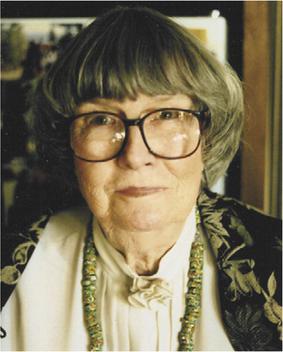
Margaret Thaler Singer was an American clinical psychologist and researcher with her colleague Lyman Wynne on family communication. She was a prominent figure in the study of undue influence in social and religious contexts, and a proponent of the brainwashing theory of cults.
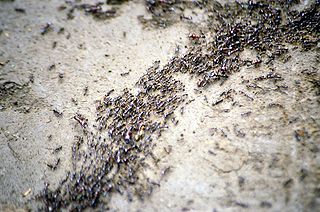
Stigmergy is a mechanism of indirect coordination, through the environment, between agents or actions. The principle is that the trace left in the environment by an individual action stimulates the performance of a succeeding action by the same or different agent. Agents that respond to traces in the environment receive positive fitness benefits, reinforcing the likelihood of these behaviors becoming fixed within a population over time.
The term large-group awareness training (LGAT) refers to activities—usually offered by groups with links to the human potential movement—which claim to increase self-awareness and to bring about desirable transformations in individuals' personal lives. LGATs are unconventional; they often take place over several days, and may compromise participants' mental wellbeing.
A cliché is a saying, idea, or element of an artistic work that has become overused to the point of losing its original meaning, novelty, or figurative or artistic power, even to the point of now being bland or uninteresting. In phraseology, the term has taken on a more technical meaning, referring to an expression imposed by conventionalized linguistic usage.
A thought-terminating cliché is a form of loaded language, often passing as folk wisdom, intended to end an argument and quell cognitive dissonance. Its function is to stop an argument from proceeding further, ending the debate with a cliché rather than a point. Some such clichés are not inherently terminating. They only become so when used to intentionally dismiss dissent or justify fallacious logic.
Thought reform can refer to:
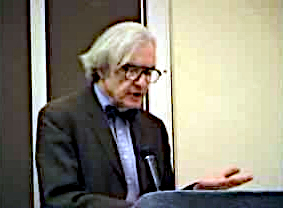
Robert Jay Lifton is an American psychiatrist and author, chiefly known for his studies of the psychological causes and effects of wars and political violence, and for his theory of thought reform. He was an early proponent of the techniques of psychohistory.

The People's Volunteer Army (PVA), officially the Chinese People's Volunteers (CPV), was the armed expeditionary forces deployed by the People's Republic of China during the Korean War. Although all units in the PVA were actually transferred from the People's Liberation Army (PLA) under the orders of Chairman Mao Zedong, the PVA was separately constituted in order to prevent an official war with the United States. The PVA entered Korea on 19 October 1950 and completely withdrew by October 1958. The nominal commander and political commissar of the PVA was Peng Dehuai before the ceasefire agreement in 1953, although both Chen Geng and Deng Hua served as the acting commander and commissar after April 1952 following Peng's illness. The initial units in the PVA included 38th, 39th, 40th, 42nd, 50th, 66th Corps; totalling 250,000 men. About 3 million Chinese civilian and military personnel had served in Korea throughout the war.
The anti-cult movement, abbreviated ACM and also known as the countercult movement, consists of various governmental and non-governmental organizations and individuals that seek to raise awareness of religious groups that they consider to be "cults", uncover coercive practices used to attract and retain members, and help those who have become involved with harmful cult practices.
This glossary of education-related terms is based on how they commonly are used in Wikipedia articles. This article contains terms starting with A – C. Select a letter from the table of contents to find terms on other articles.
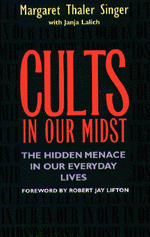
Cults in Our Midst: The Hidden Menace in Our Everyday Lives is a study of cults by Margaret Singer and Janja Lalich, Ph.D., with a foreword by Robert Jay Lifton.

The following outline is provided as an overview of and topical guide to thought (thinking):

Combating Cult Mind Control is a nonfiction book by Steven Hassan, first published in 1988. The book presents itself as a guide to resisting the mind control practices of destructive cults, and focuses on the research of Margaret Singer and Robert Lifton as well as the cognitive dissonance theory of Leon Festinger. Hassan published a revised edition in 2015 which updated information on organizations that he alleges practice mind control and use social media to increase their influence.

Thought Reform and the Psychology of Totalism: A Study of "Brainwashing" in China is a non-fiction book by psychiatrist Robert Jay Lifton on the psychology of brainwashing.

A system is a group of interacting or interrelated elements that act according to a set of rules to form a unified whole. A system, surrounded and influenced by its environment, is described by its boundaries, structure and purpose and is expressed in its functioning. Systems are the subjects of study of systems theory and other systems sciences.
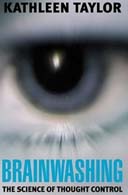
Brainwashing: The Science of Thought Control is a 2004 popular science book explaining mind control, brainwashing, thought reform and coercive persuasion by neuroscientist and physiologist Kathleen Taylor. It explains the neurological basis for reasoning and cognition in the brain, and proposes that the self is changeable, and describes the physiology of neurological pathways. It reviews case studies including Patty Hearst, the Manson Family, and the mass murder/suicide of members of Peoples Temple at Jonestown, and compares the techniques of influence used by cults to those of totalitarian and communist societies. It lays out a model FACET – Freedom, Agency, Complexity, Ends-not-means, and Thinking – which she believes can be used to negate the influence of brainwashing techniques.
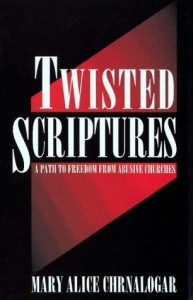
Twisted Scriptures: Breaking Free from Churches That Abuse is a non-fiction book by Mary Alice Chrnalogar, published by Zondervan. Chrnalogar instructs readers on how to determine if a religious group is manipulative or abusive, and describes techniques of mind control. The book was first published in 1997 by publishers Whitaker House and Control Techniques, and republished in 2000 by Zondervan. A Spanish language edition was published in 2006 by Vida.
Thought reform in China, also known as ideological remolding or ideological reform, was a campaign of the Chinese Communist Party (CCP) to reform the thinking of Chinese citizens into accepting Marxism–Leninism and Mao Zedong Thought (Maoism) from 1951 to 1952. Techniques employed included indoctrination, "struggle sessions", propaganda, criticism and self-criticism, and a variety of other techniques.
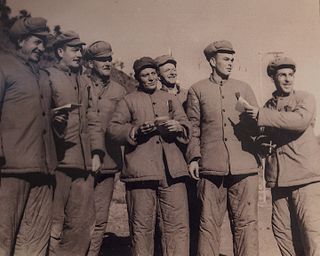
Biderman's Chart of Coercion, also called Biderman's Principles, is a table developed by sociologist Albert Biderman in 1957 to illustrate the methods of Chinese and Korean torture on American prisoners of war from the Korean War. The chart lists eight chronological general methods of torture that will psychologically break an individual.